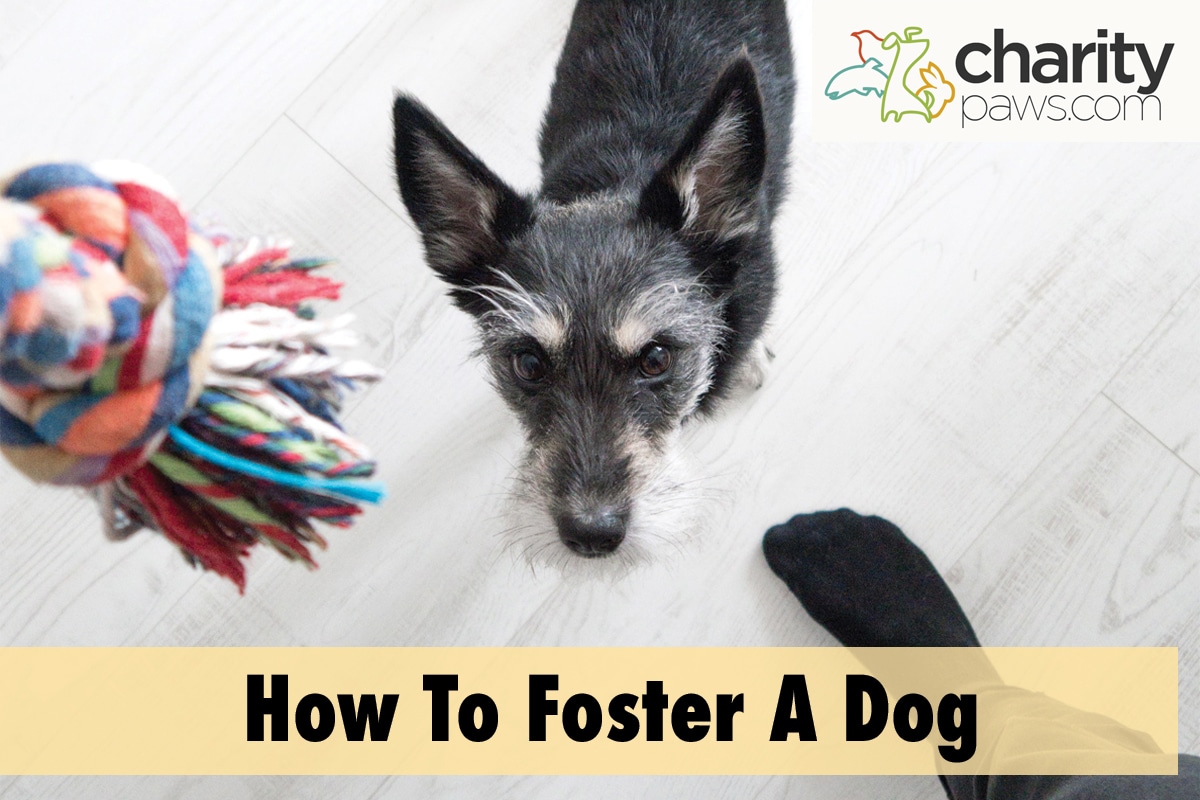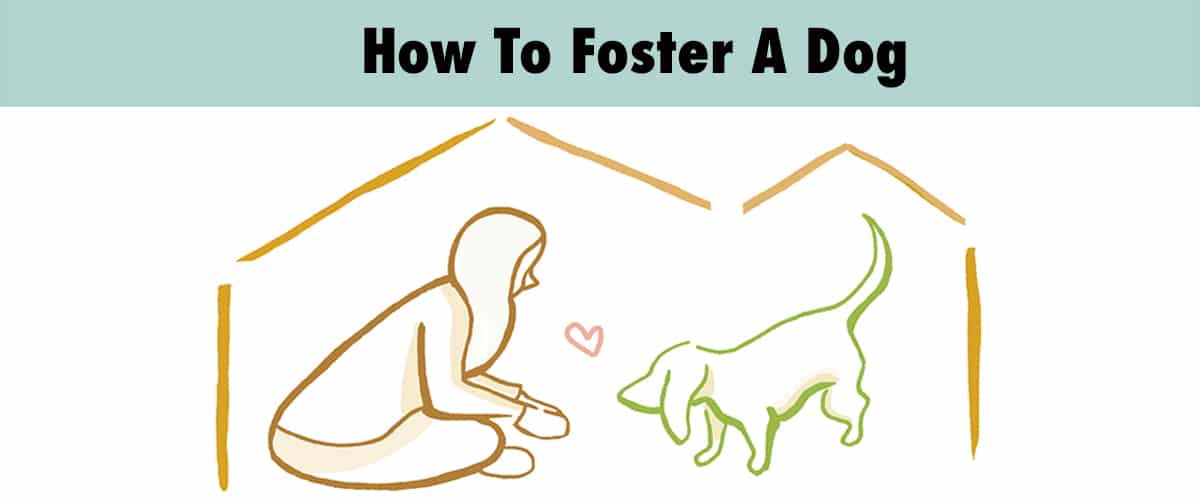If you love doggies, fostering a dog is one of the most rewarding things you can do.
Offering shelter for an abandoned dog, bonding with them, and building a relationship of love and trust will provide you with experiences you will treasure for years to come.
Of course, you will be making one shelter dog extremely happy, but at the same time, it can be a remarkable experience for you as well.
In this article, we will cover what you should expect from fostering a dog, how you know you are ready to foster a dog, how to foster a dog, and how to become a foster dog parent.
But first, let’s start with the basics.
What Does It Mean To Foster A Dog?

According to ASPCA, 3.3 million dogs are surrendered to shelters each year in the U.S. alone.
About 1.6 million of these dogs are adopted to new homes, but it may take a while for the shelter to find the perfect home for the dogs they rescue.
Adopting a rescue dog means you are providing that pup with a permanent home. It means you are committing to your new pet fully and, if everything goes well, offering them a home for the rest of their lives.
Fostering a dog, on the other hand, means you will be taking home a shelter dog and providing it with a home for a few weeks or even months until a more permanent home is found for them.
Dogs that are fostered out from shelters are typically small puppies or individuals who get stressed in the shelter and benefit from a home environment.
Dogs that are shy, old, or recovering from an injury or sickness are often fostered as well.
Foster homes are also needed to teach rescue dogs some basic skills before being adopted, and to learn more about their personality, so the people at the shelter know what kind of a home is suitable for that individual.
Offering dogs to be fostered also frees up space in the shelter.
Sometimes dog rescues may not even have a shelter, and they need foster homes to provide rescued dogs care while they find a new home for them.
We are happy to see you are considering fostering a dog because it increases their chances of being adopted.
When surrendered to a shelter, animals can quickly learn bad habits and become institutionalized.
Therefore, by providing a temporary home for a dog, you are helping them become the perfect pet that gets adopted to a permanent home as soon as possible.
Fostering is a wonderful way to help homeless animals, but are you up to the job?
Should I Foster A Dog?
We are also happy to see that you are asking yourself whether you should adopt a dog.
That is the first step to becoming a responsible foster pet parent.
You are an animal lover, and dogs are close to your heart. Of course, you also want to help homeless animals.
But what else does it take to foster a dog, and should you do it?
You don’t actually need previous experience if you want to foster a dog.
You just need to be someone who loves animals and has the willingness to help and learn.
It’s great if you have prior understanding and knowledge about dogs, or you are an experienced owner because they can pair you up with a pooch that needs training or may have behavioral problems.
On the other hand, if you are not experienced with dogs, the shelter can help you learn everything you need to know and let you foster a dog that matches your level of experience.
Fostering can also be a great option if you are hoping to get a dog, but you are not sure if you are ready to commit financially, emotionally, and time wise.
With a foster dog, you can see if a dog would fit into your life more permanently and whether you are ready to take on the responsibility.
Or, if you are already a dog owner and you are thinking of getting your pup a buddy, you might try fostering another dog first to see if you are up to caring for two canines.
In the end, it’s not just about the experience of willingness to help. You need to look at the practical aspects as well.
When considering fostering a dog, you should also ask yourself things like:
- What size of a dog can I foster in my home?
- Are there any considerations regarding their breed?
- Can I handle training?
- Can I foster an active dog?
- Can I deal with behavioral issues or medical problems?
- Does the foster dog need to be comfortable with kids or other pets?
Also, if you are looking to foster a dog, you should have a strong desire to help shelter dogs find good homes because fostering is not just about cuddles and playtime.
When becoming a foster parent of a dog, you should always consider the emotional side.
It can be difficult to take a dog home with you, bond with them, and let them go just as you become best friends.
How will you handle having to say goodbye to your new best friend – maybe even quite unexpectedly?
Although there is always the aspect of having to say goodbye, most dog fosters still find that fostering a dog, even for a few weeks, is worth it all.
What Is Expected From A Dog Foster?
Fostering a dog in need may sound like a wonderful idea, but before calling a shelter, you should carefully consider if you have
- The financial means to care for a dog
- Enough space in your home
- The time needed to properly take care of a dog
Shelters usually have tight budgets, so foster parents are not compensated for fostering.
However, it can be very rewarding in many ways, and sometimes shelters offer foster homes the basic dog gear they need, like a leash, some food, toys, and a crate.
Many shelters also take care of any veterinary expenses that may arise during the foster period.
In addition to having enough time, space and money, you also need to consider yourself as a person.
Do you have the patience it takes to help a dog adjust to its new home?
Can you keep up a consistent routine?
If you feel like you can provide a safe and loving temporary home for a rescue dog, becoming a foster dog parent is a great idea.
Just keep in mind that as a dog foster, your responsibilities include providing:
- Food and water
- Socialization
- Exercise
- Affection
- Training
You may also be asked to attend obedience classes, report back to the shelter about your foster dog, and talk to potential adopters about the dog’s personality to see if the home would be a good fit.
The level of commitment expected from dog fosters can vary from shelter to shelter, so make sure to talk to the rescue team before deciding to become a foster parent.
Some dogs may need to be fostered for just a couple of days, while others may need a temporary home for several months.
Also, sometimes the dog stays with you until the shelter finds them a good home, while other times it can be a predetermined period of time.
Animal shelters may also have requirements you need to meet in order to foster a dog.
Here are some of the common ones:
- You can’t work long hours because the dog needs company, and foster dogs often don’t want to be left alone at the beginning.
- You can’t have kids or other pets because moving to a new home is stressful for the dog as it is. Also, because foster dogs can be unpredictable in their behavior, they must not be left alone with children or other animals.
- Your home needs to be quiet, and you need to have a consistent routine for the dog to adapt more easily.
Although many shelters have requirements for their dog fosters, don’t hesitate to contact a shelter even if you don’t meet the standards.
There is always a chance they have a dog that is perfect for your home.
Challenges Of Fostering A Dog
Although fostering a dog can be a rewarding experience, it may also come with its challenges.
Rescue dogs may have a rough past, and some may have even dealt with violence or neglect, resulting in distrust in people.
While other abandoned dogs may have been beloved pets in a caring home, others may have lived on the streets.
The past will significantly affect what kind of a foster home a dog needs.
In addition, depending on the dog, it may be fully trained or lack all the basic skills from house training to walking on a leash.
They may also have behavioral issues or have a challenging personality.
Some of the common challenges with rescue dogs include:
- Biting when threatened
- Territorial behavior with food
- No house training
- Destructive behavior
- Lack of obedience training
Because all dogs are different, it is crucial that you talk to the shelter and decide to foster a dog that matches your experience level and how much you are looking to commit to fostering.
This way, both you and your foster dog will have a good and worthwhile experience.
Still, usually, the biggest challenge in fostering a pup is giving up your furry friend.
It can be emotionally hard to let them go after spending weeks or months together.
Although saying goodbye can be difficult, keep in mind that you are saving lives and helping shelter dogs find a permanent and loving home.
Also, goodbyes mean that there is a free spot to give another abandoned dog a second chance.
How To Become A Foster Dog Parent

If you have considered all the responsibilities of a dog foster, and you think you can provide a loving temporary home for a rescue, you should go for it.
Once you have made your mind up, you are probably wondering how to become a dog foster?
Start with these steps:
- First, you need to find a reputable animal rescue in your area. ASPCA and Petfinder are examples of good resources you can trust when finding a shelter that is looking for foster parents for dogs.
- Next, visit the shelter and talk to people that have fostered dogs from that facility. You will want to make sure you know what you are getting into and what the rules are with this specific facility.
- Then talk to the people that operate the animal rescue. Ask them how they run their shelter and foster program. Not only will you and the dog need to be a good fit, you and the shelter will also have to agree on the practicalities of fostering a dog.
- When you find a shelter that you can see yourself working with, it’s time to fill out an application. Most shelters have a screening process in place to make sure they pair the right dog with the right home. Having to return to the shelter could be devastating for a pet, so be prepared to answer questions about your home, lifestyle, family, and experience with dogs. A home visit may also be required to ensure your home is suitable for fostering a pup.
After these steps, you will work with the shelter to find your perfect foster dog.
You will probably visit the dog at the facility to be introduced and to see if it looks like things may work out between you two.
This is a good time to ask questions to find out as much as you can about the dog you are about to foster.
Having the details about their past will help you understand their behavior at home and make sure you two are a good match.
Once you find the ideal foster dog for your home, it’s time to prepare for their arrival!
Preparing To Foster A Dog
Some animal rescues are able to provide you with some basic things for the foster dog, but often you will have to make sure you are prepared and get all the things the dog needs by yourself.
You should be sure to have essential dog gear such as:
- A harness and a leash
- Dog bed or crate
- Dog food and bowl
- Toys and treats
Also, you will need to dog-proof your home to make sure it is safe for your foster dog.
These are some of the key things you should do:
- Declutter and clear out any possibly dangerous objects
- Cover trash cans and put away foods that may be toxic to dogs
- Make sure that household chemicals are safely stored
- Make sure the fence is intact
- Consider a baby gate to keep your dog away from areas like the kids’ room
Bottom Line – How To Become A Dog Foster
If you are reading this article, you are probably someone that has a big heart and a love for animals.
We applaud you for considering fostering a dog because you are doing a wonderful thing to help an abandoned pup get a second chance at finding a caring home.
Not only that, but you are literally saving their life. Most dogs in shelters are euthanized because of the lack of support or homes available.
Also, you are being a responsible prospective pet parent because you are doing your research on how to foster a dog and asking yourself, “should I foster a dog.”
The bottom line to fostering dogs is that you have to be able to provide a safe, affectionate, and loving home, although it may only be for a few days or weeks.
You will need to commit to spending time with your foster dog, training them, and sticking to a routine that makes them feel secure in your home.
At the end of the day, becoming a foster parent to a dog is a big responsibility that needs to be considered carefully.
At the same time, it is a chance to form a unique bond with a new furry friend.
It’s a job where you get paid with cuddles, kisses, and mutual affection.

